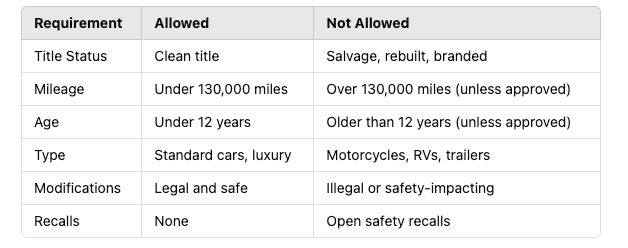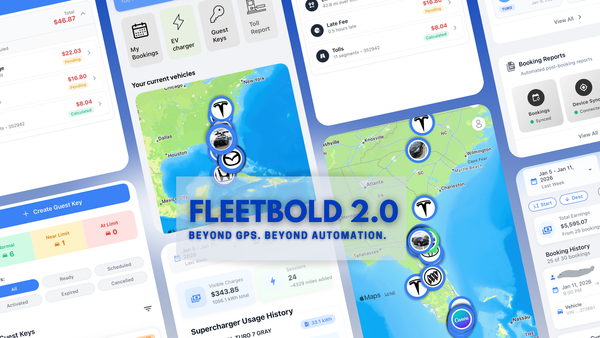Turo Vehicle Eligibility Requirements 2025
Get the complete guide on which vehicles are accepted on Turo and what makes them eligible, based on Turo’s official policy.

Why Vehicle Eligibility Matters on Turo Listing your car on Turo can be a great source of income, but not all vehicles qualify. To ensure guest safety and quality of experience, Turo enforces a set of vehicle eligibility standards. These rules are strict but fair, and understanding them is essential before listing any vehicle.
Clean Title Requirement Turo only accepts vehicles that have a clean title. Vehicles with the following are not eligible:
- Salvage titles
- Rebuilt titles
- Branded titles
- Total loss vehicles
Even if the vehicle looks and runs well, if it has ever been declared a total loss or has a title branded in any way, it won’t pass Turo’s requirements.
This requirement is tied directly to trust and accountability. Clean titles ensure that the vehicle hasn't gone through significant damage or been written off by insurers. From a renter's perspective, a clean title is an assurance that the car they’re driving is safe, reliable, and has a verified history. For hosts, it’s also about protecting their standing on the platform—if a claim arises and the vehicle has a title issue, the claim could be denied, leaving the host exposed to full financial responsibility.
Age and Mileage Limits Vehicles must be under 12 years old and have fewer than 130,000 miles, unless specifically approved under Turo's exception criteria. These limitations exist because older, high mileage vehicles are statistically more likely to experience breakdowns or safety issues.
In exceptional cases—like collector cars or well preserved classics—Turo allows for manual reviews. But in most scenarios, sticking to newer, lower mileage vehicles is the safest bet for both platform compliance and renter satisfaction.
Location Specific Restrictions Certain regions have added rules, especially in the U.S. where emissions testing and local registration requirements can affect your ability to list a vehicle. For example:
- California may require a valid smog check
- New York could restrict vehicles with certain modifications
- Florida may require commercial insurance depending on city ordinances
It’s your responsibility as a host to ensure that your vehicle meets both Turo’s requirements and those of your local jurisdiction.
Commercial Host Vehicles Commercial Hosts are those who operate their vehicles under their own commercial insurance policies rather than using Turo’s protection plans. These hosts have more flexibility in some areas, especially regarding vehicle branding or age, but they also must:
- Provide commercial rental insurance documentation
- Ensure vehicles meet all safety standards
- Maintain clear maintenance records
Commercial Hosts often manage larger fleets and operate at scale, which is why the vetting process is more involved.
Vehicles That Are Not Accepted
Turo explicitly bans certain vehicle types regardless of condition or history. These include:
- Motorcycles
- RVs, campers, or box trucks
- Trailers of any kind
- Off road only vehicles
- Vehicles with open safety recalls
- Cars used for towing or delivery purposes
- Vehicles with illegal or unsafe modifications
What About Exotic or Specialty Cars? Turo welcomes exotic cars that meet all platform requirements. Popular luxury listings include brands like Tesla, Mercedes Benz, Porsche, Audi, and more. However, they must still:
- Have a clean title
- Be under 12 years old (or qualify for an exception)
- Have less than 130,000 miles
- Be in excellent mechanical and cosmetic condition
Exotics may be subject to additional verification, such as proof of ownership or high resolution interior and exterior images.
Understanding Vehicle Modifications Modifying your vehicle is allowed—but only if those modifications meet safety and legal standards. Turo generally disallows:
- Lift kits that impact handling
- Loud exhaust systems
- Nitrous oxide systems
- Non DOT approved lighting
Factory approved upgrades and cosmetic enhancements (like wraps or window tints within legal limits) are generally acceptable. If unsure, it’s best to reach out to Turo’s support for pre approval.
The Importance of Open Recalls An open recall disqualifies your vehicle, even if it’s minor. This policy stems from legal compliance and safety priorities. You can check for recalls by entering your VIN at NHTSA.gov.
Verification and Inspection Requirements Turo may require additional steps before your listing is approved:
- Clear, recent photos showing all sides
- Close ups of interior and dashboard
- Odometer reading
- Current registration and insurance proof
In some cities, in person inspections are mandatory for high-value or fleet vehicles. Always keep digital copies of required documents ready.
Table: Vehicle Eligibility at a Glance

Tips to Ensure Your Vehicle Is Eligible
- Run a vehicle history report to confirm clean title status
- Fix open recalls immediately at a licensed dealership
- Photograph your car with natural light for clarity and detail
- Track maintenance in a digital logbook
- Double check VIN and registration before submitting to Turo
Conclusion Understanding and following Turo’s vehicle eligibility requirements is the first step toward building a reliable and successful car sharing business. Turo wants to protect both guests and hosts, which is why their policies are designed with safety and trust in mind. Make sure your vehicle checks all the boxes before listing it, and you’ll be one step closer to turning your car into a steady income source.
FAQs
Can I list a car with a rebuilt title on Turo? No, vehicles with rebuilt, salvage, or branded titles are not allowed on the platform.
What’s the maximum mileage Turo accepts? Typically under 130,000 miles, unless the car qualifies for an exception.
Can I list a 15 year old classic car? Only if it qualifies for a classic car exception. Contact Turo support for review.
Does Turo accept Teslas and other EVs? Yes, as long as they meet mileage, title, and safety requirements.
Can I list a car with a minor recall? No. Turo does not allow vehicles with any open safety recalls.
Do I need to provide a Carfax report? Not mandatory, but it’s highly recommended to confirm title status.
Are trucks and SUVs allowed? Yes, provided they meet all other platform requirements.
Can I list a modified car on Turo? Only if the modifications are legal, safe, and don’t interfere with core systems.
What documents do I need to list my vehicle? Proof of registration, title, and clear photos are the minimum. Maintenance records may also be required.
Does Turo inspect every vehicle? Not always, but they reserve the right to request an inspection or additional documentation at any time.
Can I appeal if my vehicle is rejected? Yes, but decisions are usually final unless new documentation or corrections are submitted.
What happens if I list a disqualified vehicle anyway? Your listing could be removed, and your account may be suspended or permanently banned.
Can a branded title be cleared and accepted later? Even if a branded title is cleared through DMV processes, Turo still considers its full vehicle history and may decline the listing.
How do I request an exception for a classic vehicle? You must contact Turo support and provide detailed documentation, including high quality images and maintenance history.
Does Turo differentiate between personal and commercial hosts for eligibility? Yes. Commercial hosts may have more flexibility but are still subject to safety and documentation checks.
Should I notify Turo if my vehicle changes status? Absolutely. If your car undergoes significant changes, including title status, condition, or mileage updates, you must inform Turo to maintain eligibility.





